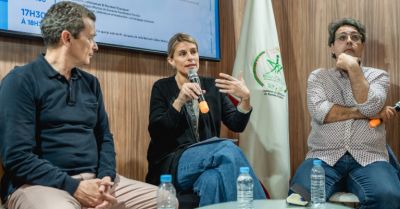A meeting on the theme: "Morocco and Spain. Literature and translation: a universal language" was held on Saturday 11 May 2024 at the Pavillon commun. The event was held to coincide with the 29th session of the Rabat International Book Fair and the activities of the Council of the Moroccan Community Abroad. Moroccan-Spanish author Mohamed El Morabet was the guest speaker at "Une Carte blanche", an open discussion featuring Rocío Rojas Marcos, writer and professor in the Department of Arabic and Islamic Studies at the University of Seville, and Gonzalo Fernández Parrilla, professor of Arabic and Islamic Studies at the Autonomous University of Madrid.
This event examined various aspects of literature and translation between Morocco and Spain, and analysed the literary genres being translated in an attempt to identify ways of bringing together the cultures of both countries.
The participants insisted on the importance of translation in order to inscribe the text in the culture from which it was translated. An act likely to breach barriers across nations, allowing each culture to join the world literature competition. The authors cite the case of Kalila wa Dimna, which, thanks to translation, has now become an integrated part of the Spanish culture, as "local literature is written by authors, while international literature is written by translators", a statement by the writer José Saramago, quoted by
Gonzalo Parilla. Rocío Rojas Marcos stressed that without translations it would not be possible to know the Other, just as modern Europe could not have made itself known without the Arabic translations in the Middle Ages.
Mohamed Choukri in the footsteps of Don Quichotte?
In his address, Mohamed El Morabet compared Don Quichotte's role as a Spanish literary heritage in Moroccan culture with the absence of a literary figure of this magnitude in the Spanish imagination. In analysing this observation, both Spanish academics felt that the Moroccan literary figure closest to the Spanish is the character of Mohamed Choukri, who brought the Spanish public into closer contact with Moroccan culture thanks to the strength of his literature and his narrative. However, Mohamed Choukri's works were translated into French before they were translated into Spanish, which raises another literary issue between Morocco and Spain linked to the language
of translation.
transmitting Moroccan works to the Spanish public can change certain cultural contents, since they pass through a different filter depending on the translator.
Although Gonzalo Fernández Parrilla believes that this is due to the complexity of translating from Arabic into Spanish, Rocío Rojas Marcos believes that this historical observation is above all linked to Spain's position in Europe, which leads it to orient its cultural perspective more towards the countries of its continent than towards Morocco, preferring to translate Moroccan works published in France rather than works from Morocco.
And what about writers of Moroccan origin in Spain?
According to Gonzalo Fernández Parrilla, Spanish writers of Moroccan descent have reflected the concerns of the community: the literature produced in the Spanish language by writers of Moroccan origin that has emerged over the last two decades was initially characterised by its concern with issues of identity, rootedness and integration in the host country. A trend from which Moroccan writers in Spain quickly 'freed themselves', once these subjects had been assimilated and more or less overcome, to give way to different subjects.
What about writers of Moroccan origin in Spain?
According to Gonzalo Fernández Parrilla, Spanish writers of Moroccan origin have reflected the concerns of the community: the literature produced in the Spanish language by writers of Moroccan origin that has emerged over the last two decades was initially characterised by its interest in issues of identity, rootedness and integration in the host country. A trend from which Moroccan writers in Spain quickly 'freed themselves', once these subjects had been assimilated and more or less overcome, to give way to different subjects.
A "natural" development for Rocío Rojas Marcos, who believes that in "any literary work, the author first seeks to explain his position within the new society". Mohamed El Morabet doesn't share this view: "As a Moroccan writer in Spain, I don't know in advance what I'm going to write about or what subject I'm going to write about; I write as part of a constant search for a subject".
CCME



